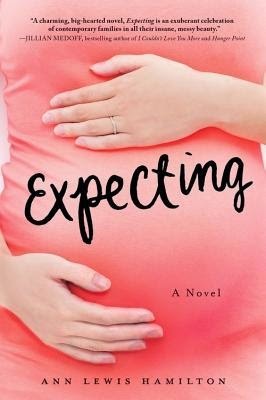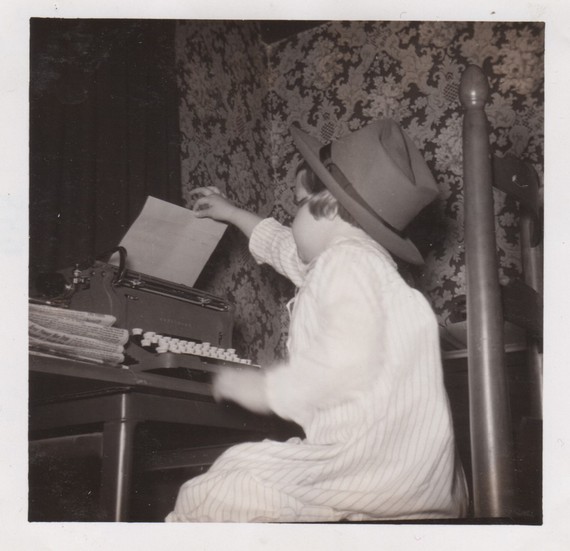At the center of Ann Lewis Hamilton's debut novel, Expecting, is the serious issue of infertility. Surrounding this seriousness, Hamilton skillfully layers funny, slightly absurd, completely plausible events that create a twisted modern tale of family.
Hamilton is an accomplished, writer with a long resume of TV and film credits that include, among others, Haven, The Dead Zone, Grey's Anatomy, Saved, Providence, Party of Five, and thirtysomething. She has won awards and been nominated for others, so, I asked her, why turn to writing a novel?
"I love writing for TV," Hamilton said. "When it works well, it's this fabulous collaborative environment. If you're stuck, you can run down the hallway and people will help you fix it. At the same time you have a lot of notes and a lot of other people to please. Writing a novel, on the other hand, is a lonely, solitary endeavor."
Hamilton says she found herself talking to herself. A lot. And loudly. She may have freaked out her dog. She definitely freaked out her daughter. "There's something crazed about writing a book. But there's no network interference and there's no one telling you what to do," she added. "And I'll do it again."
Under the best circumstances, the difficulties and challenges of getting pregnant can put a good relationship in peril. For Alan and Laurie, the couple at the center of Expecting, unexpected challenges create unexpected responses. Having had two miscarriages, Laurie and Alan are unsure if they will ever be able to have a child of their own. They visit a fertility clinic where an arrogant doctor promises them a baby. Ignoring the brutish, ill-mannered physician, they go ahead with a fertility treatment. After all, they want a child. On the scheduled day, Alan rushes his sperm over to be inseminated in Laurie.
All is good and Alan and Laurie become optimistic that they will finally become parents. That's when the clinic calls to let the happy couple know that a disgruntled clinic worker switched Alan's sperm with that of Donor #296. Yes, Laurie is pregnant and the pregnancy has taken. It's just not Alan's baby. His sperm, they are told, was tracked down to a dumpster--which pretty much sums up how Alan feels about his role as father to this baby. He's been tossed out with the trash.
With her history of miscarriages, Laurie has no intention of ending this pregnancy and trying again with Alan's sperm. While Alan is truly crazy about Laurie, he is mostly in shock and remains disconnected from this pregnancy, unable to get past being left out of his child's gene pool. He responds to it with his own version of a breakdown. But even when Alan behaves badly, Hamilton makes sure he remains a sympathetic character.
Things quickly become increasingly tense and bizarrely funny as Laurie tracks down and befriends Donor #296, Jack, a directionless UCLA student who can't figure out a major and who sold his sperm to pay off a fraternity debt. Jack's response is to man-up, and rise to the occasion, which only adds to the absurd comedy, as he's not needed. Still, as he embraces his imagined and real version of fatherhood, he finally grows up. Like his sperm inside Laurie, Jack comes of age in Expecting.
And while Alan remains ambivalent about his role as father to Laurie's child, every other person who is remotely connected to Jack or Laurie or Alan instantly claims their special relationship with this child to be, making Expecting even more pleasantly absurd.
"One of the things I loved about writing Expecting is that it's a debate what you would do if you were the mom or the dad or the donor," Hamilton said. "There are so many places where the characters could say no, but they don't."
It wasn't inevitable that Hamilton became a writer, but she does claim to have been raised in a house filled with typewriters in a town where her grandfather was the editor of the local newspaper, her father a reporter, and her mother the society page writer. Her goal growing up her goal was to write and draw for MAD magazine.
Moving forward, Hamilton is working on a novel about a woman whose mother dies, "But funny," she said. "I want to look at what it's like to lose a mother in an odd, unpredictable way."
Her enthusiasm for all forms and all genres is infectious. "One of the things that I love about being a writer," she said, "is that the older you get the better you get."
Which is why, I can't wait for her next novel.


